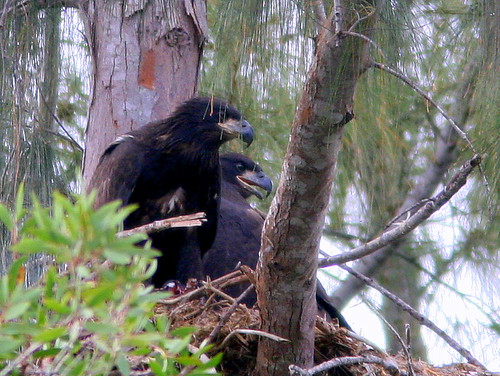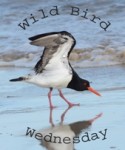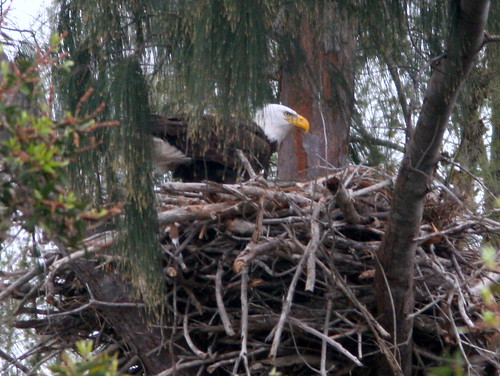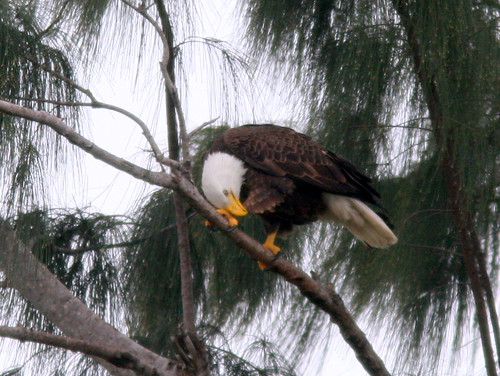Posted by: Ken @ 1:16 pm
Last spring, two little Bald Eagles, whom the students named “Hope” and “Justice,” successfully fledged from our local nest:
Local Middle School science students will again collect and analyze data about the activities of an eagle family, to try to determine whether traffic density on a nearby highway has any effect upon their behavior. Nest watchers share observations with each other on an Eagle Nest Watch Forum, which had over 50,000 views during its first year of operation. An Eagle Milestone spreadsheet report summarizes selected observations made by adult volunteers during the present and past breeding seasons of the Bald Eagles nest. These are the first eagles to nest in urban Broward County, Florida, since DDT was abolished in the 1970s. The report may be viewed here (PDF). To see all Rosyfinch Ramblings blog posts about these eagles, visit this link.
Based upon the eagles’ change in behavior, I concluded that the first egg hatched (or began to hatch) around noon on Friday, January 22. These changes, first documented by a veteran observer, were:
1) Incubating adult began resting higher in the nest
2) Increased movement and changes of orientation in the incubating adult
3) Frequent looking down into the nest.
Earlier that day, we had found the incubating adult continuously sitting very low in the nest, as it usually appeared since incubation began on December 18, 2009. This was the 35th day of incubation, which is also the average length of time it takes a Bald Eagle egg to hatch.
The next day, January 23, observers reported more movement, almost restlessness on the part of the incubating/brooding adult, which sat higher (more of its body visible above the nest rim) and kept looking into the nest. Later that day, another experienced observer saw both adults together, looking down into the nest, something we saw last year just after the chick hatched. There is probably a second, and possibly a third egg in the nest, yet to hatch.
Since eagles begin incubating as soon as the first egg is laid, and the eggs are deposited about 3 days apart, they hatch out in the order in which they were laid. This gives the first chick a size and strength advantage over the others. If food is scarce, it will out-compete its nest-mates for nourishment, and they will die of starvation, be evicted or even eaten by the oldest eaglet. Last year, both chicks survived and fledged in mid-April. By the end of May they flew off on their own.
Previously, the bird sat so low that we could barely see the top of its head. Often, the incubating female would not be visible at all. This photo was taken in December:
Here is my photo taken on January 23, showing the posture of the incubating female. Note that the full head and part of her back were now visible:
This morning (January 24) there was evidence of a prey item in the nest, something no one has yet reported to happen during the incubation period of the first egg. Unlike Red-tailed Hawks, which I have observed bringing food to the incubating member of the pair, these eagles merely exchange incubating duties and then go off to hunt individually. No one saw the food being brought in, but we saw the adults tearing at it, eating and possibly reaching down to feed the chick.
When we arrived around 9:00 AM this morning, two other regular observers were already there. The female was preening in the melaleuca roost tree to the west of the nest:
The male was sitting on the nest, often looking down and at least once appeared to be tearing at a prey item and possibly feeding an unseen eaglet:
The female took flight, flew east behind the nest, then passed in front of the nest, flying west, and landed in the cow pasture to the NW of the nest tree:
Carrying what looked like small sticks and grasses, the female flew back to the nest and joined the male:
Together, they appeared to rearrange nesting material and also tear at a prey item. Then the male flew up to the first roost tree east of the nest and cleaned his bill. Note the brown tip on the right outermost tail feather that distinguishes this male from the female:
The male continued to roost for a short time, then flew to the south and disappeared:




















January 29th, 2010 at 12:24 am Excellent photos and great story of the Eagle pair Ken. We have a pair nesting here in Redding, in northern California. The have a nest cam on them you can see here. Their was much controversy around this pair as they are right next to a well traveled highway bridge that was going to undergo construction. Well, they raised two eaglets and are getting ready to do it again, traffic or no traffic!
February 7th, 2010 at 6:52 am Awesome shots of the Eagles! It is wonderful they are so successful nesting.